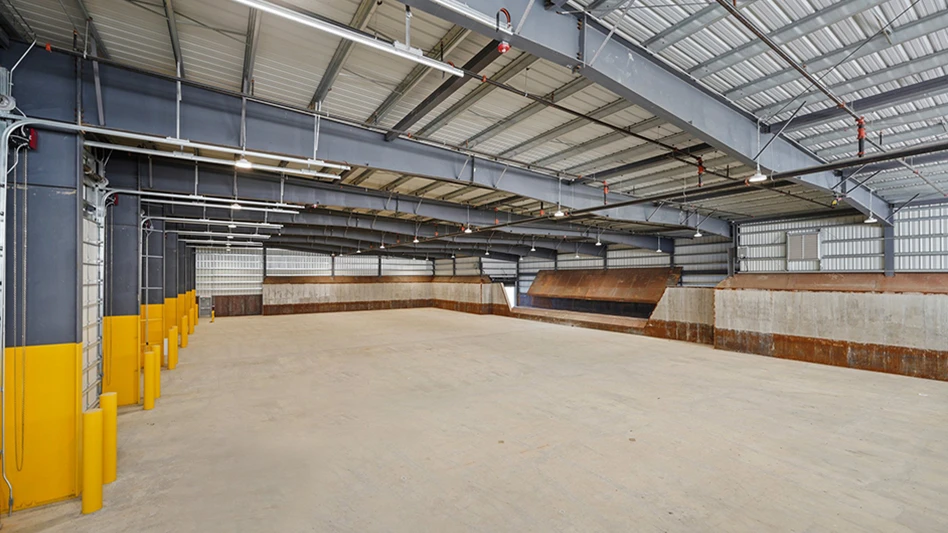Jim Fish, CEO of Houston-based Waste Management, sat down with National Waste & Recycling Association (NWRA) President Darrell Smith Tuesday at WasteExpo 2018 to share his thoughts on the state of the waste and recycling industries.
The topic of safety was front and center during the discussion, with Fish saying that if the industry is to improve upon its status as the fifth-most dangerous occupation, an institutional shift needs to take place in how companies think about protecting workers and pedestrians.
“Part of it has to be a consistent message with respect to safety and in terms of how we treat safety and how we talk about safety,” Fish said. “We all talk a lot about safety, we all say it has to be the top thing that we do. And by the way, I’d say that safety is not an initiative, safety is not something we take on this year as one of our objectives. Safety has to be ingrained in your culture.”
Fish noted that proactive approaches to legislation, such as fines issued for drivers who are caught texting behind the wheel, could help curtail preventable accidents. He also noted that some emerging technologies are going to be instrumental in helping refine safety practices in the coming years.
“I think this is an industry that is constantly innovating, and there are opportunities within the cab of the truck,” Fish said. “We talk about safety, and the cameras inside of the truck, in my mind, have been the biggest safety development in the last three decades. It’s a coaching mechanism for us. Sometimes it actually exonerates drivers [when accidents do take place].”
As important as new safety technologies portend to be in reducing on-the-job injuries and fatalities, they might also be pivotal in addressing the industry’s worker shortage, Fish said. He talked about how drivers’ ability to collect customers’ waste using a joystick rather than manually collecting it not only helps keep workers safe but also makes the job easier and more appealing. As waste collection becomes more automated, these technologies will further reduce the stress on haulers.
Fish switched topics to address how China’s recent ban on imported recyclables marks a turning point in how waste management companies need to think about waste.
“I do understand why China is pushing back on this. If I was in China’s shoes, I wouldn’t want to import trash from the United States and Canada, and that’s effectively what they were doing,” Fish said. “If I think of our own facilities, and I think we do an excellent job of running our facilities, but still the contamination, the trash that has come in the front door, has gone from 10 to 15 percent five years ago to 20 to 25 percent. Everybody in the room who is familiar with recycling can give you a horror story of something that has come into a recycling plant. And while I think China has taken some aggressive steps, I don’t see any reason why they’d go backwards. I do think there is a light at the end of the tunnel, but I do think it’s going to have to be a light where we take control of the model, and I think the model has to change for this to be something we stop talking about.”
Fish said that while consumer education is important in helping reduce recycling contamination, advocacy groups should focus their energy on reaching out to municipalities. He cited how municipalities put such an emphasis on diverting waste from landfills, that items that should be landfilled end up at recycling plants where they effectively serve as contamination.
“Municipalities are so focused on that first step away from the curb [not being the landfill] that they’ve lost sight of what the original intent of recycling was, which was to save natural resources,” Fish said. “That’s what’s best for the environment, but it’s not necessarily the best for the environment if my diversion goes from 50 percent to 75 percent, and 80 percent of that is ultimately trash.”
Proper recycling is becoming more pressing as landfill space continues to become sparser throughout the country. While Fish said that technology is currently being developed that will mitigate this problem in the future, dwindling landfill space is presently one of Waste Management’s biggest concerns.
“In 50 years, and maybe less than that, maybe in 20 years, there will be a replacement technology that helps with this problem with these landfills going away,” Fish said. “You’re not going to take all these big cities’ waste and transport it 1,000 miles to some field out in the middle of nowhere.”
Although there are a number of challenges in the waste industry, Fish concluded his talk by stressing how the industry is well-positioned for future generations.
“In this industry, there’s not the bright shiny object necessarily, but this is a fantastic business that has a great growth trajectory. It’s a safe industry, and it’s a great industry to make a career in,” Fish said.
WasteExpo 2018 was April 23-26 at the Las Vegas Convention Center.
Get curated news on YOUR industry.
Enter your email to receive our newsletters.Latest from Waste Today
- ReMA board to consider changes to residential dual-, single-stream MRF specifications
- Miller Environmental Group Inc. appoints CEO
- DPI acquires Concept Plastics Co.
- Laurel Mountain Capital announces investment in 5280 Waste Solutions
- Cielo investor requests annual meeting
- WIH Resource Group celebrates 20th anniversary
- NWRA: NIOSH cuts a step in the wrong direction
- Valicor Environmental services acquires Affordable Waste Management





